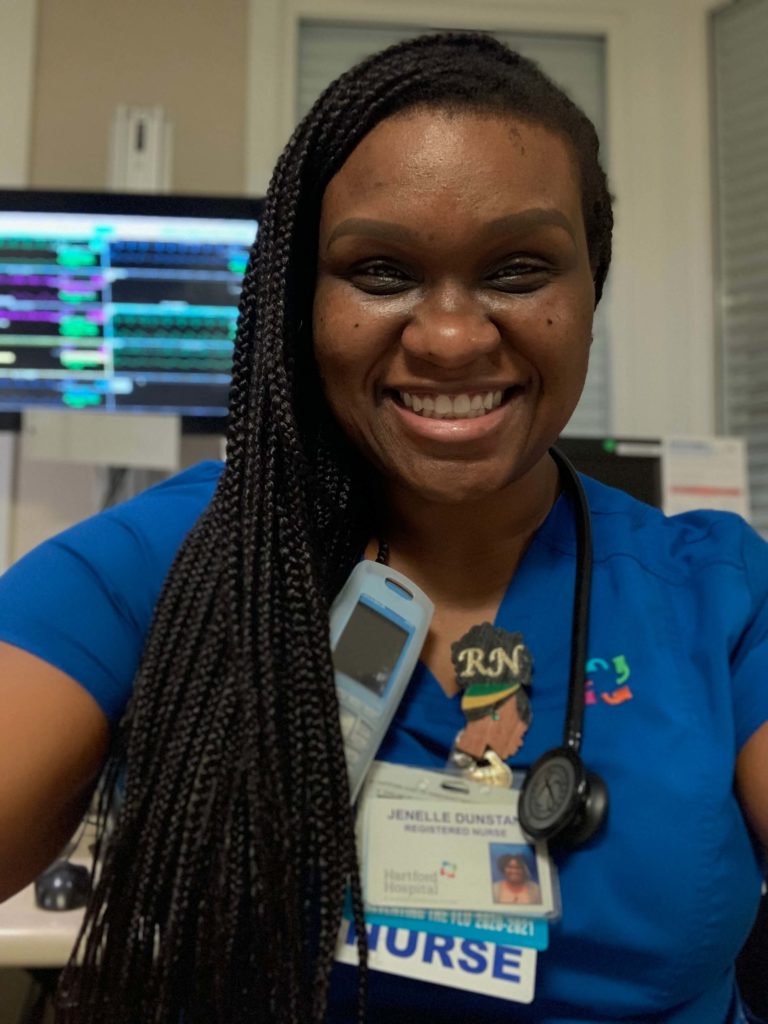Jenelle Dunstan ‘09 racked up serious accolades during her three years at Watkinson — 3-sport varsity athlete (volleyball, basketball and lacrosse), Global Studies Program diploma student, and recipient of the Sir Winston Churchill Award (History Department award) and the Monique Colletti Award (most outstanding female athlete). It is no surprise that she has continued her winning ways as a nurse in Hartford Hospital’s Neurology, Neurosurgery, and Neuro-Trauma Unit. She just received the 2021 Florence Nightingale Award for the Ayer Neuroscience Institute at Hartford Hospital.
After Watkinson, Jenelle attended Syracuse University, where she majored in biology and Spanish. After graduating from Syracuse in 2013, Jenelle was a project coordinator for UPenn’s Mobile CPR Project and a residential program worker for Oak Hill (CT Institute for the Blind). After Jenelle completed UCONN’s prestigious and competitive one-year accelerated nursing program in 2017, she landed in the neurology department at Hartford Hospital.
Jenelle says she didn’t always know she wanted to be a nurse. “When I went to Syracuse in 2009, I initially planned to attend medical school. It was only after I witnessed the role of the nurse in the care of my father that I became interested in nursing. He was hospitalized for nearly a month after I graduated from Syracuse. It pained me to see how unreachable his doctors were, and the difficulty we had in getting a clear picture of his daily care from medical staff. We relied more on nursing staff to keep us up to date with his care plan. Medical professionals, although very caring and responsible, don’t play a personal role in the care of patients. Their time at the bedside is minimal, and often doesn’t make much of an impact on the course of stay, in my observation. My mother is also a seasoned nurse. Her ability to advocate for my father during his stay was mostly aided by her understanding of the nursing role and expectations of the medical staff. That’s how I learned, if you want something done, ask a nurse.”

As we all know, nursing itself took on a whole new dimension during the pandemic. “People should know that there was a great sentiment of hopelessness,” Jenelle says. “We received our first COVID patient at Hartford Hospital around March. It took until April for my unit to transition from a Neurology/Neurosurgery unit to strictly a COVID unit. In discussions with seasoned nurses, they attested they’ve never seen such systemic changes in such a short period of time. During the early months of COVID, there were no real answers or definitive plans. There were no textbooks or references to help in how best to care for this disease. Now, in 2021, we are able to look back at the error of our ways, but also see great improvement in the plan of care. People are surviving more, we are less scared to care for this population, and more hopeful for a new normal.”
Being a nurse during the pandemic was a deep learning experience, says Jenelle. “I learned mostly about my resilience and ability to lead. By 2020 I was two years into nursing, technically somewhat a veteran in an acute care setting. In this case, many novice nurses were depending on my experience to help them as well. There’s not much room to panic when you’re seen as the individual in the know. I gained a new game face, one that would help my peers and patients to feel less anxious during a time of great fear. I also learned the importance of self-care. There were times when I hit my limit, and needed to tap out in order to regroup.”
Jenelle gives credit to Watkinson for shaping her character and preparing her for the work she is doing. “Watkinson is a school that fosters out-of-the-box thinking. As a result, I never see anything just at face value. My Watkinson teachers taught me to dig deeper with a questioning attitude. I used to be so upset with myself for not having perfect grades sometimes; I learned that sometimes it’s okay to not be perfect. In healthcare, everything will not be perfect. Yet, with perseverance and experience, the outcome is more than often optimal. The care I give is an example of the culture in which I was raised at Watkinson. I made it a habit to try everyday. The model for learning at Watkinson taught me the autonomy of my own journey. There was no cookie-cutter course to help me prepare for a career or future that requires sound decision-making. While being a three-sport athlete, high honors student, fluent in Spanish, community-involved, and a native of Hartford, Watkinson was the key to building me into the unique character I am today.”
Read more profiles at watkinson.org/everblue
